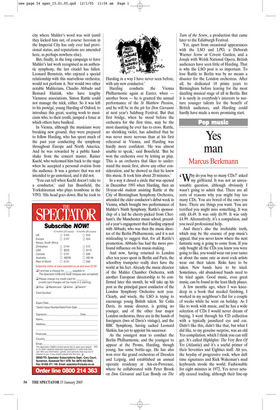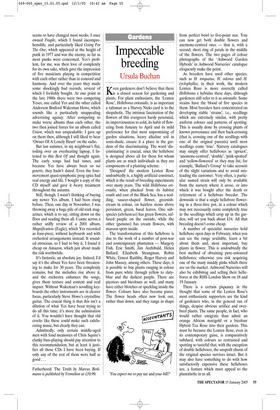Yes man
Marcus Berkmann
‘hy do you buy so many CDs?’ asked Wmy girlfriend. It was not an unreasonable question, although obviously I wasn’t going to admit that. There are all sorts of reasons why you might buy too many CDs. You are bored of the ones you have. There are things you want. You are terrified you might miss something. It was only £8.49. It was only £6.99. It was only £4.99. Alternatively, it’s a compulsion, and you need professional help.
And there’s also the irrefutable truth, which may be the essence of pop music’s appeal, that you never know where the next fantastic song is going to come from. If you only bought all the CDs you knew you were going to like, you would wear out your tastes at about the same rate as most rock artists wear out their talent. Risks have to be taken. New bands have to be tried. Sometimes, old abandoned bands need to be tried again. Good music, even great music, can be found in the least likely places.
A few months ago, when I was kneedeep in a book that needed finishing, I worked in my neighbour’s flat for a couple of weeks while he went on holiday. As I like to work with music, and he has a wide selection of CDs I would never dream of buying, I went through his CD collection with a typically jaundiced eye and ear. Didn’t like this, didn’t like that, but what I did like, to my genuine surprise, was an old Yes compilation, which I think you can still get. It’s called Highlights: The Very Best Of Yes (Atlantic) and it’s a useful primer of their Seventies and Eighties stuff. Ah yes, the heyday of progressive rock, when daft time signatures and Rick Wakeman’s mad keyboards strode the world. Fashionable for eight minutes in 1972, Yes never actually ceased trading, although their line-up seems to have changed most weeks. I once owned Fragile, which I found incomprehensible, and particularly liked Going For The One, which appeared at the height of punk in 1977 and was the enemy, as far as most punks were concerned. Yes’s problem, for me, was their love of complexity for its own sake, which gave the impression of five musicians playing in competition with each other rather than in concord and harmony. And over the years they made some shockingly bad records, several of which I foolishly bought. At one point in the late 1980s there were two competing Yeses, one called Yes and the other called Anderson Bruford Wakeman Howe, which sounds like a particularly unappealing advertising agency. After competing to make worse albums than each other, the two then joined forces for an album called Union, which was unspeakable. I gave up on them then, although I still liked to hear ‘Owner Of A Lonely Heart’ on the radio.
But last summer, in my neighbour’s flat, toiling over an overheating laptop, I listened to this Best Of and thought again. The early songs had had tunes, and because Yes have always been so sui generis, they hadn’t dated. Even the fourmovement quasi-symphonic prog epics had real energy and life. I bought a copy of the CD myself and gave it heavy treatment throughout the autumn.
Still, though, I wasn’t thinking of buying any newer Yes album. I had been stung before. Then, one day in November, I was throwing away a huge pile of old rock magazines, which is to say, sitting down on the floor and reading them all. I came across a rather sniffy review of a 2001 album, Magnification (Eagle), which Yes recorded as four-piece, without keyboards and with orchestral arrangements instead. It sounded atrocious, so I had to buy it. I found it cheap on Amazon, which just about made the risk worthwhile.
It’s fantastic, an absolute joy. Indeed, I’d say it’s the album Yes have been threatening to make for 30 years. The complexity remains, but the melodies rise above it, and the orchestra enhances the songs, gives them texture and context and real impact. Without Wakeman’s noodling keyboards the other instruments are in clearer focus, particularly Steve Howe’s crystalline guitar. The crucial thing is that this isn’t a dilution of what Yes have been trying to do all this time; it’s more the culmination of it. You wouldn’t have thought that old crocks like these could make such exhilarating music, but clearly they can.
Admittedly, only certain middle-aged men with fond memories of Chris Squire’s clanky bass-playing should pay attention to this recommendation, but at least it justifies all those CDs I have been buying. If only any of the rest of them were half as good...






















































 Previous page
Previous page